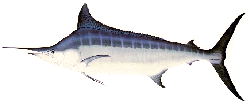Welcome to
Chambers and Associates
Scientific Consultants Committed to the Conservation of Marine Fish and
their Essential Habitats
Experts in the
Protection of Estuarine and Riverine Ecosystems from Damaging Water Resource
Developments
(Wetlands Destruction, Water Diversions, Toxic Contaminant Releases and
Nutrient Loading),
and in the
Conservation and Management of Large Ocean Fish Populations
(Atlantic Swordfish, Bluefin Tuna, Blue Marlin and White Marlin)
Essential Inshore Habitats are Being Destroyed
Importance of Shallow Water Habitats - About 75% of the nation's commercially important species of marine fish and shellfish and 80-90% of recreationally important species are dependent for their survival (for spawning, nursery, migration and feeding areas) on shallow inshore waters that include bays, estuaries and rivers flowing to the sea.
Wetlands Losses - The nation has lost more than half its original wetlands to development.��
Toxic Contaminants and Disease - As many as 20% of the bottom-dwelling fish living in our most highly urbanized estuaries have cancerous livers and up to 70% of such fish have other types of disease leading to cancer.
Nutrient Loading - Nutrient over-enrichment from sewage treatment facilities and from fertilizers in stormwater runoff from farms and lawns are producing massive "dead zones" in many U.S. coastal waters.
Dams and Diversions of Freshwater Flows - Rivers and streams that have been dammed and whose flows have been diverted for irrigation of agricultural areas have experienced even larger ecosystem damage than that caused by most wetlands losses and pollution, combined.�
Fishery Resources Declines - In the United States, most inshore-dependent species of fish and shellfish have declined in abundance by 75 to 95% of their former levels. The two primary causes, of roughly equal proportion, are overfishing and habitat loss and degradation.
Many Big Game Fish Appear Headed for Extinction
Many of the world's� premiere marine game fish are near or are rapidly approaching extinction within a decade.� In the Atlantic Ocean (including the Gulf of Mexico and Caribbean Sea) these include:
�� Swordfish - considered by some as the ultimate big game species, reaching at least 2,200 lbs.
�� Blue Marlin- the largest, reaching 3,000 lbs.
�� White Marlin - the primary marlin caught by U.S. East Coast anglers, maximum size of about 200 lbs
�� Sailfish - among Florida's premiere big game species rarely over 75 lbs.
�� Bluefin Tuna - power and endurance above all; may reach 2,000 lbs.
For a detailed view of any species' situation, click on its name above.
The primary cause is industrial-scale commercial fishing by many nations throughout the world's oceans using non-selective and highly destructive fishing gear, particularly longlines, purse seines and gillnets.� Longlines average over 25 miles in length and use hundreds to thousands of hooks.� Unfortunately, these catch and kill larger numbers of the young of the species targeted (swordfish and tunas) as well as unintended victims such as many other species of fish, marine turtles, birds and mammals.� Roughly half are already dead when brought to the vessel to be cut free.�� It is this kill of marlin, sailfish, juvenile swordfish and bluefin tuna that is of such great concern because of their low and rapidly declining populations.�� See our section entitled Headed for Extinction for the details. �
Chambers and Associates' principal has over two decades of experience in conducting scientific assessments and policy evaluations of all nationally significant water resource development projects and policy affecting U.S. marine fishery resources or their habitats.� He has led the effects assessment division and the research division of the National Marine Fisheries Service's National Habitat Protection Program.� For its first four years, he also led the agency's national contaminants monitoring program for detecting the presence of disease in coastal fishery resources and in their habitats, nation-wide.� Many of the scientists who are now involved as associates of the firm were colleagues who were involved in these scientific programs over the past 20 years.� The firm conducts environmental impact assessments for major water resource development proposals, and it develops policy positions on agency fishery management plans, regulations and the need for new legislation to rebuild and conserve populations of swordfish, marlin, sailfish and tuna.�
Conservation of Marlin, Swordfish, Sailfish, Bluefin Tuna and Sharks
Because of the severity of the decline of Atlantic white marlin (and blue marlin), Chambers and Associates' principal and the Biodiversity Legal Foundation jointly filed a petition (100+ pages) on August 31, 2001, with the National Marine Fisheries Service to "list" the species as an "endangered" or as a "threatened" species under the U.S. Endangered Species Act. The text of the petition can be found using the link below. This action was undertaken to force the U.S. government to exert leadership nationally and internationally to prevent this Atlantic-wide species (and Atlantic blue marlin) from slipping into extinction. The primary cause of mortality - commercial longline vessels - must be excluded from fishing in these species' primary spawning and feeding areas. However, providing protection to white marlin will also benefit blue marlin, swordfish and sailfish because all use the same "hot spots" for their spawning and feeding areas.
As another example of its conservation efforts, Chambers and Associates developed a report for the U.S. Congress and for the Administration evaluating the reasons for the loss of the Atlantic Ocean's premiere game fish and has recommended legislative and policy solutions to rebuild these population to sustainable levels.� It is titled "Rebuilding North Atlantic Swordfish."� Copies can be obtained free from the Recreational Fishing Alliance (RFA) by calling 1 (888) JOIN RFA or by email at [email protected].
Environmental Impact Assessment
Chambers and Associates are scientific consultants able to help other organizations in their battles to address unwise water resource development projects, nation-wide.� As an example, the firm has assisted Earthjustice (formerly Sierra Club) Legal Defense Fund to overturn permits issued by the Corps of Engineers for three major casino, hotel, entertainment, shopping complexes which were to be constructed in largely undisturbed wetlands of coastal Mississippi.� Chambers and Associates prepared two expert declarations for use by Earthjustice in its successful federal court suit against the Corps.� These documents evaluate the adequacy of environmental assessments conducted by the Corps and upon which its permit decisions were based.� Of particular concern are the adverse effects associated with greatly increased nutrient and toxic pollution loading to Bay St. Louis and the Back Bay of Biloxi, and the effects of extensive secondary development that each casino complex will stimulate in the sparsely populated watersheds north of both bays.� In the end, the court voided all 3 permits issued by the Corps and ordered that Environmental Impact Statements (EISs) be prepared prior to any construction.� This was a big victory for fish and wildlife and for Earthjustice and Chambers and Associates.

Wetlands, Estuaries, Rivers and Coastal Waters
Essential Fish Habitat
Environmental Impact Assessment Division
Who are the
Friends and Enemies of Fish in Congress?
Swordfish, Billfish, Tuna and Sharks
Severity of Atlantic Population Declines
White Marlin ESA Listing Petition
Articles about Big Game Fish and Fishing
Photos of World Record Fish
Chambers and Associates
Description of the Firm
Awards for the Website
List of All Pages on the Website
Home

9814 Kensington Parkway
Kensington Maryland 20895-3425
(T) 301-949-7778��� (Fax) 301-949-3003